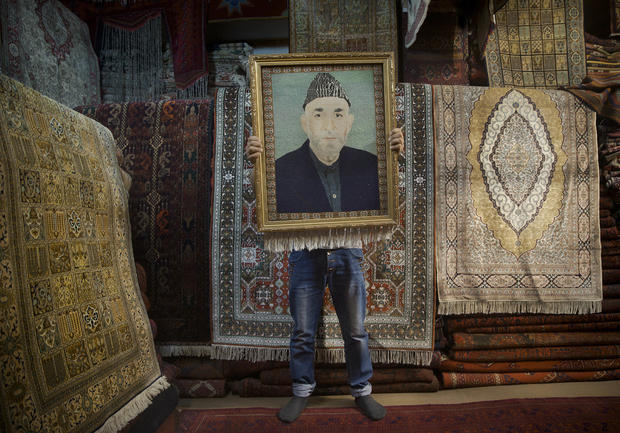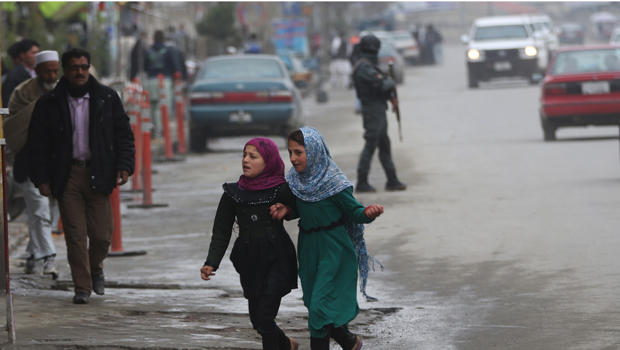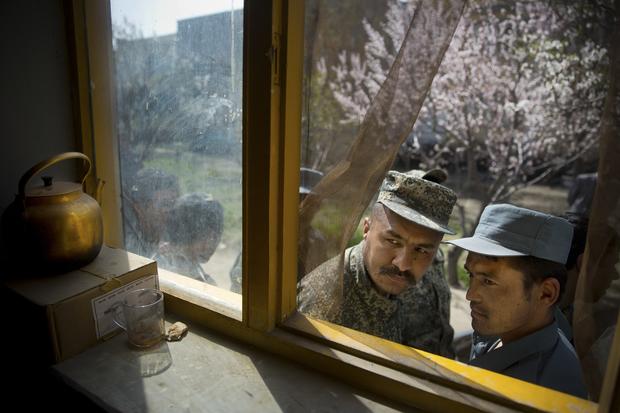Afghanistan goes to the polls amid enduring poverty - and corruption
KABUL, Afghanistan - Two Afghan women shrouded in black emerged from a campaign rally carrying bundles of sticks with pieces of torn posters still attached. The women weren't intending to knit back together what pictures remained of the presidential hopeful. They simply needed firewood to heat their home.
Afghanistan's enduring poverty - and corruption - is making it easier for the Taliban to make inroads nearly 13 years after a U.S.-led invasion ousted them from power.
The voting, taking place amid heavy security, got underway when the Afghan election chief cast his ballot.
Independent Election Commission chairman Ahmad Yousuf Nouristani urged all Afghans to vote on Saturday as he marked his ballot live on television. Men and women lined up more than an hour before the polls opened.
The militants have vowed to disrupt Saturday's nationwide elections for a new president and provincial councils with violence, and recent high-profile attacks in the heart of Kabul are clearly designed to show they are perfectly capable of doing just that.
On Friday, a veteran Associated Press photographer, Anja Niedringhaus, was killed and an AP reporter, Kathy Gannon, was wounded when an Afghan policeman opened fire while the two were sitting in their car in the city of Khost, in eastern Afghanistan. The two were at a security forces base, waiting to move in a convoy of election workers delivering ballots.
If voters turn out in large numbers and the Afghans are able to hold a successful election, that could undermine the Taliban's appeal by showing democracy can indeed work.
Nearly 200,000 Afghan security forces planned to fan out on Saturday to protect polling stations and voters. On Friday evening, mobile phone messaging services stopped working in the capital, Kabul, in what appeared to be a security measure by authorities to prevent militants from using messages for attacks.
Three men are considered top contenders in the race - a major shift from past elections dominated by Karzai, who has ruled the country since the Taliban were ousted in 2001. That has presented Afghans with their first presidential vote in which the outcome is uncertain.
There do not appear to be major policy differences toward the West between the front-runners - Abdullah Abdullah, Karzai's top rival in the last election; Ashraf Ghani Ahmadzai, an academic and former World Bank official; and Zalmai Rassoul, a former foreign minister. All have promised to sign a security agreement with the United States that will allow thousands of foreign troops to remain in the country after 2014 - which Karzai has refused to do. The candidates differ on some issues such as the country's border dispute with Pakistan. But all preach against fraud and corruption and vow to improve security.
The candidates have stumped for votes with near-daily debates and rallies across the Texas-sized country, a far greater level of campaigning than in the past, when certain blocs of voters were largely taken for granted in a patronage system. They also have named running mates including warlords, leaders from rival ethnic groups and in some cases, women. None is expected to get a majority needed to secure a win outright, so a runoff between the top two vote getters is widely expected.
"The election excitement is being felt all over the place," said Aimal Jan Ghafoori, who worked at a voter registration center in the southern city of Kandahar. "It's really good to see this change. I hope this change helps in changing the fate of our country soon enough."
He said barely three dozen people showed up to register each day in 2009, when massive vote-rigging marred Karzai's re-election, while as many as 300 lined up daily to beat Tuesday's deadline to register for this year's elections for president and provincial councils.
But the attacks in Kabul over the past few weeks are threatening to scare voters away from the polls as Afghans worry security forces unable to guard areas previously considered safe won't be able to protect them on election day.
In Friday's attack in Khost, a unit commander named Naqibullah walked up to the car with the AP photographer and reporter, yelled "Allahu Akbar" - God is Great - and opened fire on them in the back seat with his AK-47.
Anja Niedringhaus, 48, an internationally acclaimed German photographer, was killed instantly, while Kathy Gannon, an AP correspondent who for many years was the news organization's Afghanistan bureau chief and currently is a special correspondent for the region, was shot twice and later underwent surgery. She was reported as being in stable condition.
Security forces have been on high alert since a suicide bomber struck the entrance of the heavily fortified Interior Ministry in Kabul on Wednesday, killing six policemen. Police are searching cars and checking ID cards at checkpoints. Streets in the capital are unusually empty of traffic as many people stay home for fear of more bloodshed.
"I have no interest in going to vote on election day," said bank employee Jawad Furmoli. "People are very sad and it will be a dangerous day."
"If the situation continues like this, I don't think anyone will go to the polling stations," said Wafaq Arya, who was near the Interior Ministry when it was attacked on Wednesday. "It will badly affect the elections."
The three front-runners all have expressed concern about fraud in the balloting, particularly government interference.
International officials say a level of fraud is to be expected but note that Afghan electoral officials have learned from the past and implemented strict protocols to minimize it. That includes bar codes on the ballot boxes being delivered to nearly 6,500 polling centers in all 34 provinces and plans to tally the results immediately after the vote closes and post a copy of the results at each center.
Graeme Smith, an analyst with the Brussels-based International Crisis Group, said all signs pointed to a heavy turnout despite fears of violence, in part because voters actually feel like they have a choice.
"The indications are that people are going to vote, at the very least tribes and local strongmen are going to be able to muster votes," he said. "The fact that it's a horse race might bring out the vote."
Afghans interviewed at various campaign rallies and elsewhere are largely united about one thing: They are disappointed at the lack of progress after more than 12 years of war. The new president will face high expectations to alleviate poverty and clean up the government in a country that Transparency International last year ranked among the three most corrupt in the world alongside Somalia and North Korea.
Many Afghans also are worried about the impending withdrawal of international combat forces that is putting billions of dollars in international reconstruction aid at risk.
The U.S. and its allies, meanwhile, are hoping for a chance to reset relations that have been badly damaged following several disputes with Karzai, including his refusal to sign the security pact.
International forces are taking a backseat in the elections, although they have provided air support to help the Independent Election Commission deliver at least 400 tons of ballots and other election materials to remote provinces. Donkey caravans often take it from there, hauling boxes along treacherous mountain paths.
Brig. Gen. Daniel O'Donohue, the chief operations officer for NATO-led forces, expressed confidence that the Afghan security forces were prepared to secure voters. He acknowledged the Taliban remain able to stage brazen assaults that draw headlines but insisted the militants will be unable to derail the voting.
"All they can do is try and act as a spoiler," he said this week during an interview on the vast military base on the edge of Kabul. "Our estimate of it is they have the capability to do these high-profile attacks but they don't have the ability, you know, to contest the Afghan security forces or to affect the essential security that they are providing for the election."


